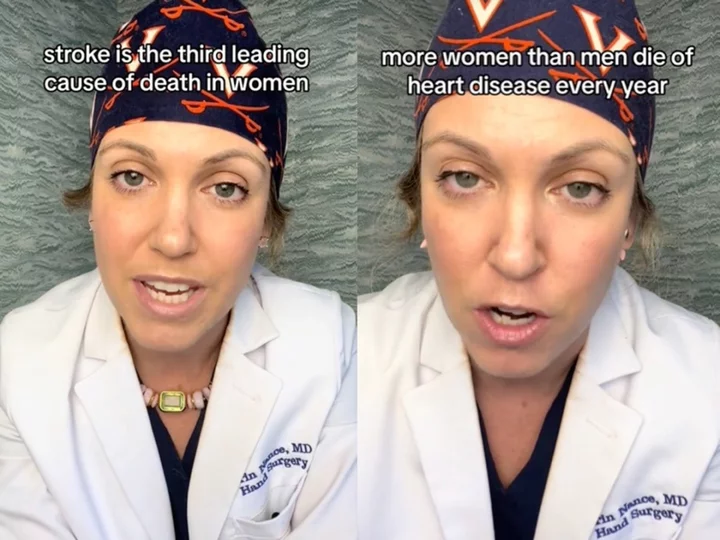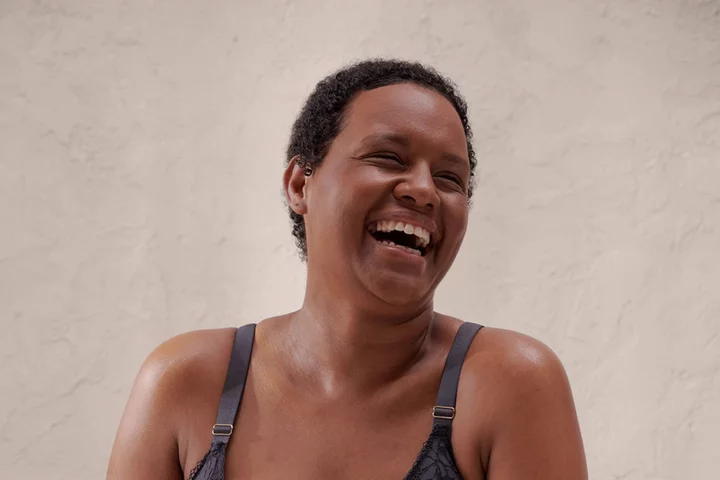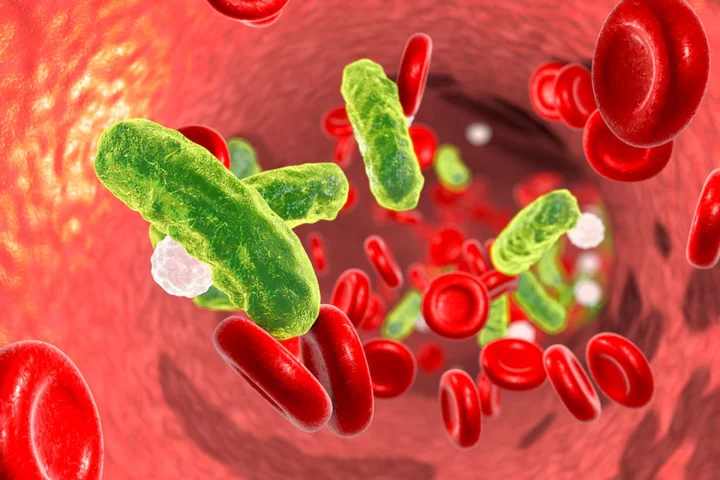From strokes to heart attacks: Doctor highlights most commonly misdiagnosed health conditions in women
It’s no secret that women are more likely than men to be misdiagnosed by a medical professional. In fact, as many as 57 per cent of women have reported being wrongly diagnosed by a doctor. In 2016, a study found that women have a 50 per cent higher chance than men of receiving a misdiagnosis after a heart attack, while researchers found in 2014 that 33 per cent of women are more likely than men to be misdiagnosed after a stroke. When it comes to women’s health, an explicit gender bias in medicine can lead to serious and sometimes life-threatening results. That’s why Dr Erin Nance, an orthopaedic hand and wrist surgeon located in New York City, has dedicated the month of October to sharing the most commonly misdiagnosed health conditions that affect women. Her series has since gone viral on TikTok, as she discussed how symptoms of rare autoimmune disorders or infertility can present differently in women, leading to a misdiagnosis. For the first video of the series, Dr Nance revealed how postural orthostatic tachycardia syndrome - also known as POTS - affects more than one million people, but is present in mostly women aged 20 to 50. However, Dr Nance explained that POTS is so difficult to diagnose because “we can’t see it”. “This is the group of women that get written off by doctors because they look healthy. There doesn’t seem to be anything wrong with them,” she said. According to the National Institute of Neurological Disorders and Stroke, POTS is a condition in which a reduced volume of blood returns to the heart after someone stands up from a lying down position. As a result, patients with POTS may experience an increased heart rate, dizziness, or fatigue when they stand up after lying down. @littlemissdiagnosed Day 1: It’s me, POTS, I’m the the problem it’s me #littlemissdiagnosed #31for31lmd #pots ♬ original sound - Dr. Erin Nance ?? Dr Nance explained that some other symptoms of POTS include “chronic fatigue, brain fog, total body chronic pain, GI [gastrointestinal] stomach issues, anxiety, headaches, and it can affect any part of your body”. Another difficulty about POTS is that there’s “no specific treatment” to help the condition, Dr Nance said. “We can’t do a biopsy, we can’t do any imaging, there’s no blood test for it,” she added. Instead, doctors may recommend drinking more fluid, exercising regularly, or wearing compression stockings to keep blood flow in the centre of the body. For the 14th day of her video series, Dr Nance received 1.4m views when she spoke about the commonly misdiagnosed symptoms of stroke in women. “Stroke is the third leading cause of death in women,” she began the clip. “Yet, women are over 33 per cent more likely to be misdiagnosed when having an acute stroke.” Dr Nance admitted that most women who experience a stroke are often told by doctors that they simply have anxiety or a migraine. When it comes to the “unique” symptoms of stroke that are present in women, some may experience loss of consciousness or fainting; general weakness; shortness of breath; confusion, unresponsiveness, or disorientation; sudden behavioural change; agitation; hallucination; nausea or vomiting; seizures or even just hiccups. @littlemissdiagnosed Day 14: Stroke is no joke #littlemissdiagnosed #31for31lmd #stroke ♬ original sound - Dr. Erin Nance ?? “These unique symptoms are often the ones that are overlooked,” Dr Nance said, before detailing the individual risk factors that can put women at a greater chance of having a stroke. The first on the list of risk factors was taking birth control pills, followed by pregnancy, hormone replacement therapy, and history of suffering from migraines. “The reason why this is so important for everyone - every normal, everyday person - to know this is because the best outcomes are when women are evaluated and treated within three hours of having this symptom,” Dr Nance added. On day 16, the orthopedic surgeon explained how symptoms of a heart attack can also be wrongfully overlooked by doctors. “More women than men die of heart disease every year, yet women have a 59 per cent increased risk of being misdiagnosed with acid reflux, stress, or anxiety,” Dr Nance said. Besides chest pain, a woman may exhibit signs of a heart attack when she experiences unusual fatigue for several days; sleep disturbances; shortness of breath; lightheadedness; nausea or cold sweats; indigestion or gas-like pain; and pain in the arm, neck, jaw, or back. @littlemissdiagnosed Day 16: It’s not always Big on the Peloton #littlemissdiagnosed #31for31lmd #heartattack #womensheart ♬ original sound - Dr. Erin Nance ?? When it comes to multiple sclerosis (MS), Dr Nance revealed on day 19 of her video series that women are 83 per cent more likely to be misdiagnosed for MS by a doctor. MS is a disease that affects the “myelin” - the protective sheath covering the brain, nerves, and the spinal cord. According to Dr Nance, some of the often-missed signs of MS include extreme fatigue, confusion, forgetfulness, and mood swings. @littlemissdiagnosed Day 19: You’re gonna be okay #littlemissdiagnosed #31for31lmd #ms #multiplesclerosis ♬ original sound - Dr. Erin Nance ?? As for lupus - an autoimmune disease in which the immune system attacks its own tissues, causing inflammation in the body - Dr Nance shared in the 20th video of her series that women between the ages of 15 and 45 are most likely to develop the disorder. “The average time from when you first develop your symptoms to diagnosis is six years,” Dr Nance revealed. @littlemissdiagnosed Day 20: Sneaky little ? #littlemissdiagnosed #31for31lmd #lupus ♬ original sound - Dr. Erin Nance ?? She claimed that 46 per cent of patients report being misdiagnosed with something other than lupus, while “54 per cent of them were told that either nothing was wrong with them or that their symptoms were psychological.” “The main problem with lupus is that the longer you go undiagnosed and untreated, then the greater risk for end organ damages,” she added. The Independent has contacted Dr Nance for comment. Read More How to optimise your 22 minutes exercise a day according to fitness experts TikTok influencers warn about ‘potent’ steroid cream risks among black women – dermatologist explains the risks Want to be a useful man? Arnold Schwarzenegger is here to tell you how How to optimise your 22 minutes exercise a day according to fitness experts TikTok influencers warn about ‘potent’ steroid cream risks among black women – dermatologist explains the risks Want to be a useful man? Arnold Schwarzenegger is here to tell you how

It’s no secret that women are more likely than men to be misdiagnosed by a medical professional. In fact, as many as 57 per cent of women have reported being wrongly diagnosed by a doctor.
In 2016, a study found that women have a 50 per cent higher chance than men of receiving a misdiagnosis after a heart attack, while researchers found in 2014 that 33 per cent of women are more likely than men to be misdiagnosed after a stroke.
When it comes to women’s health, an explicit gender bias in medicine can lead to serious and sometimes life-threatening results. That’s why Dr Erin Nance, an orthopaedic hand and wrist surgeon located in New York City, has dedicated the month of October to sharing the most commonly misdiagnosed health conditions that affect women.
Her series has since gone viral on TikTok, as she discussed how symptoms of rare autoimmune disorders or infertility can present differently in women, leading to a misdiagnosis.
For the first video of the series, Dr Nance revealed how postural orthostatic tachycardia syndrome - also known as POTS - affects more than one million people, but is present in mostly women aged 20 to 50. However, Dr Nance explained that POTS is so difficult to diagnose because “we can’t see it”.
“This is the group of women that get written off by doctors because they look healthy. There doesn’t seem to be anything wrong with them,” she said. According to the National Institute of Neurological Disorders and Stroke, POTS is a condition in which a reduced volume of blood returns to the heart after someone stands up from a lying down position. As a result, patients with POTS may experience an increased heart rate, dizziness, or fatigue when they stand up after lying down.
@littlemissdiagnosed Day 1: It’s me, POTS, I’m the the problem it’s me #littlemissdiagnosed #31for31lmd #pots
♬ original sound - Dr. Erin Nance ?? Dr Nance explained that some other symptoms of POTS include “chronic fatigue, brain fog, total body chronic pain, GI [gastrointestinal] stomach issues, anxiety, headaches, and it can affect any part of your body”.
Another difficulty about POTS is that there’s “no specific treatment” to help the condition, Dr Nance said. “We can’t do a biopsy, we can’t do any imaging, there’s no blood test for it,” she added.
Instead, doctors may recommend drinking more fluid, exercising regularly, or wearing compression stockings to keep blood flow in the centre of the body.
For the 14th day of her video series, Dr Nance received 1.4m views when she spoke about the commonly misdiagnosed symptoms of stroke in women. “Stroke is the third leading cause of death in women,” she began the clip. “Yet, women are over 33 per cent more likely to be misdiagnosed when having an acute stroke.”
Dr Nance admitted that most women who experience a stroke are often told by doctors that they simply have anxiety or a migraine. When it comes to the “unique” symptoms of stroke that are present in women, some may experience loss of consciousness or fainting; general weakness; shortness of breath; confusion, unresponsiveness, or disorientation; sudden behavioural change; agitation; hallucination; nausea or vomiting; seizures or even just hiccups.
@littlemissdiagnosed Day 14: Stroke is no joke #littlemissdiagnosed #31for31lmd #stroke
♬ original sound - Dr. Erin Nance ?? “These unique symptoms are often the ones that are overlooked,” Dr Nance said, before detailing the individual risk factors that can put women at a greater chance of having a stroke. The first on the list of risk factors was taking birth control pills, followed by pregnancy, hormone replacement therapy, and history of suffering from migraines.
“The reason why this is so important for everyone - every normal, everyday person - to know this is because the best outcomes are when women are evaluated and treated within three hours of having this symptom,” Dr Nance added.
On day 16, the orthopedic surgeon explained how symptoms of a heart attack can also be wrongfully overlooked by doctors. “More women than men die of heart disease every year, yet women have a 59 per cent increased risk of being misdiagnosed with acid reflux, stress, or anxiety,” Dr Nance said.
Besides chest pain, a woman may exhibit signs of a heart attack when she experiences unusual fatigue for several days; sleep disturbances; shortness of breath; lightheadedness; nausea or cold sweats; indigestion or gas-like pain; and pain in the arm, neck, jaw, or back.
@littlemissdiagnosed Day 16: It’s not always Big on the Peloton #littlemissdiagnosed #31for31lmd #heartattack #womensheart
♬ original sound - Dr. Erin Nance ?? When it comes to multiple sclerosis (MS), Dr Nance revealed on day 19 of her video series that women are 83 per cent more likely to be misdiagnosed for MS by a doctor. MS is a disease that affects the “myelin” - the protective sheath covering the brain, nerves, and the spinal cord. According to Dr Nance, some of the often-missed signs of MS include extreme fatigue, confusion, forgetfulness, and mood swings.
@littlemissdiagnosed Day 19: You’re gonna be okay #littlemissdiagnosed #31for31lmd #ms #multiplesclerosis
♬ original sound - Dr. Erin Nance ?? As for lupus - an autoimmune disease in which the immune system attacks its own tissues, causing inflammation in the body - Dr Nance shared in the 20th video of her series that women between the ages of 15 and 45 are most likely to develop the disorder. “The average time from when you first develop your symptoms to diagnosis is six years,” Dr Nance revealed.
@littlemissdiagnosed Day 20: Sneaky little ? #littlemissdiagnosed #31for31lmd #lupus
♬ original sound - Dr. Erin Nance ?? She claimed that 46 per cent of patients report being misdiagnosed with something other than lupus, while “54 per cent of them were told that either nothing was wrong with them or that their symptoms were psychological.”
“The main problem with lupus is that the longer you go undiagnosed and untreated, then the greater risk for end organ damages,” she added.
The Independent has contacted Dr Nance for comment.
Read More
How to optimise your 22 minutes exercise a day according to fitness experts
TikTok influencers warn about ‘potent’ steroid cream risks among black women – dermatologist explains the risks
Want to be a useful man? Arnold Schwarzenegger is here to tell you how
How to optimise your 22 minutes exercise a day according to fitness experts
TikTok influencers warn about ‘potent’ steroid cream risks among black women – dermatologist explains the risks
Want to be a useful man? Arnold Schwarzenegger is here to tell you how









